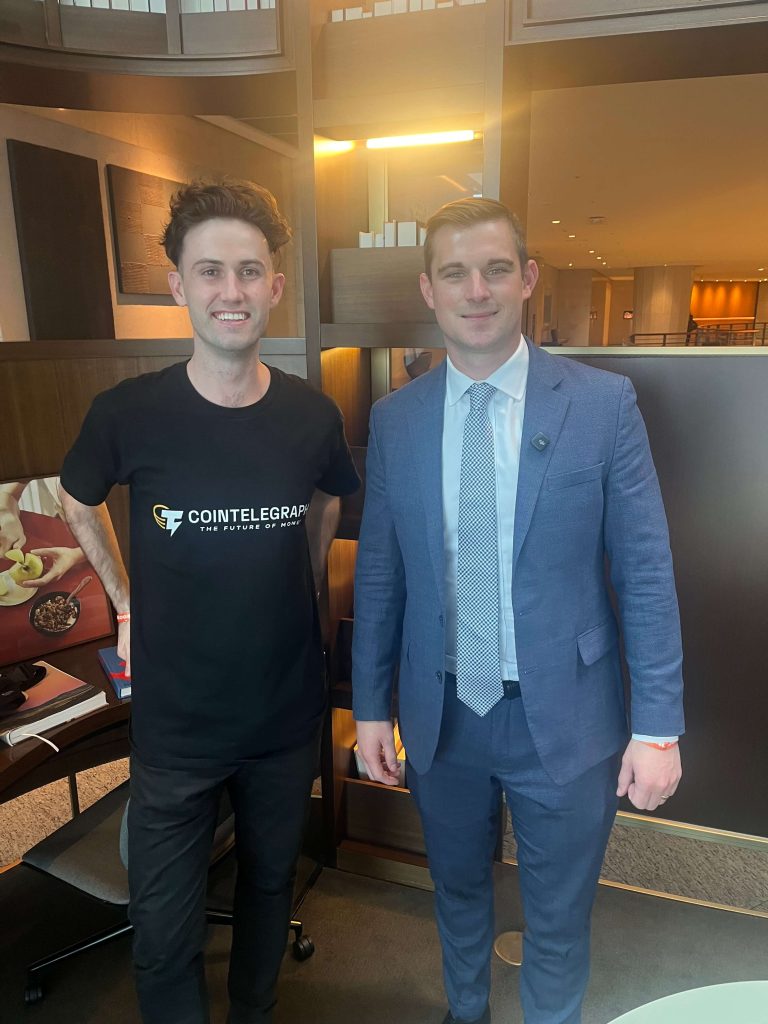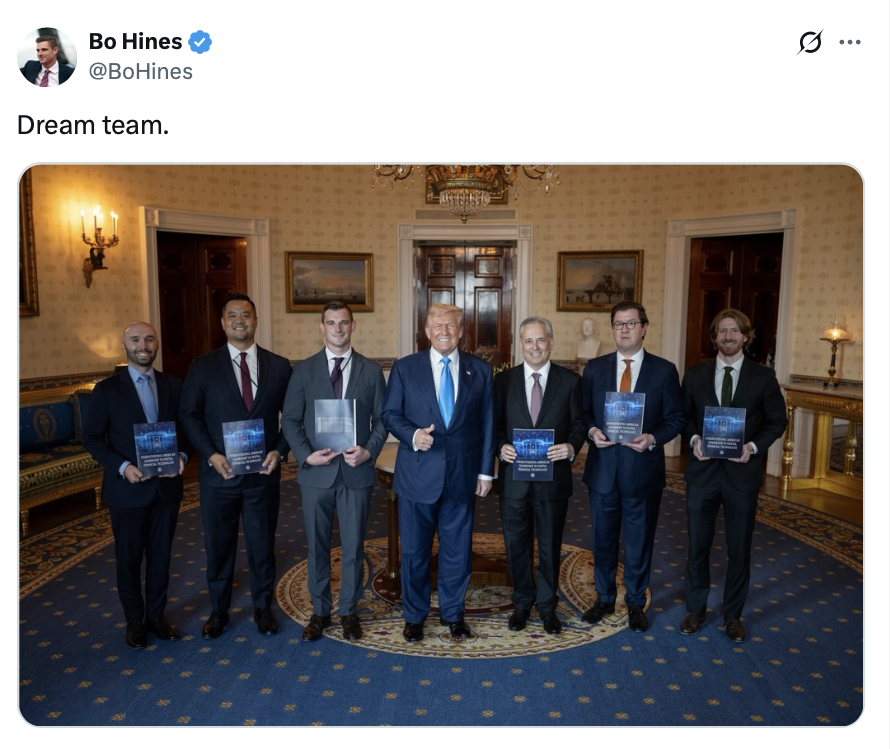Bo Hines – Cointelegraph Magazine
Tether USA CEO Bo Hines says it wasn’t an easy decision to step down as the head of US President Donald Trump’s digital assets council.
“It certainly was difficult,” Hines tells Magazine during a sit-down interview at Korea Blockchain Week, but he “felt like that was the right time.”
“We had positioned the United States to be the crypto capital of the world. That’s what the President asked us to do,” the 30-year-old explains.
Hines’ resignation on Aug. 9 came just days after Trump’s digital asset council released the 180-day report on digital assets. The timing left Hines feeling confident that the groundwork, guidelines, and framework for the US crypto industry were on the right track, as he intended to start exploring opportunities back in the private sector.
Hines says the digital assets report is “the most comprehensive report that’s ever been produced, in terms of regulatory framework, at least, giving the guidance of what we wanted to see…in terms of market structure as well.”
The report outlined policy recommendations for regulating crypto in the US, including crypto market structure, jurisdictional oversight, banking regulations, promoting US dollar hegemony through stablecoins and taxation of cryptocurrencies.
Hines’ resignation cleared the way for Patrick Witt
Hine’s departure opened the door for his deputy, Patrick Witt, to take the reins, which Hines said would give the council a fresh leading voice as it tackles more crypto legislation, such as the digital asset market structure bill, which is currently moving through the Senate.
“Going into a new round of legislative battles, it’s always good to have a fresh voice in the room…and I wanted to make sure that Patrick [Witt] was afforded that opportunity.”
Hines’s departure also came just two weeks after Trump signed the GENIUS Act, a stablecoin legislation that Hines played a crucial role in crafting.

Hines says he felt like there was an “immense opportunity” for him to step back to the private side and work on delivering what the Genius Act intended to do. “Which was to bring the brightest and most foremost innovators in the space to the US,” he says.
“Really, what I was looking for was an opportunity to build something. I mean, that’s what excites me,” Hines says.
Opportunities quickly flooded in after Hines stepped down. Within days of announcing his resignation, Hines said he had received well over 50 job offers.
He emphasized that he had not engaged in any discussions with companies before his resignation. However, given the prominence of his position, it was only natural that his departure drew significant interest from crypto companies wanting to snap him up.
On Aug. 19, he was appointed CEO of Tether USA, overseeing the company’s efforts to bring stablecoins to the financial mainstream.
“There’s no better place to build. It accounts for, you know, over half of all transaction settlements in the crypto ecosystem on a daily basis.”
At Tether, Hines is pushing ahead with the new US-based stablecoin USAT, which he says will be the first federally licensed stablecoin product in the US, giving Tether “a unique first mover’s advantage.”
Who is Bo Hines?
It may seem like a lot of responsibility for someone barely 30 years of age, but Hines insists he’d been preparing for this moment most of his life. “I had been engaging with this space from the time I was 18 years old,” he says.
However, Hines has always been a standout achiever. Born and raised in North Carolina, he went on to attend North Carolina State University, where he played college football as a wide receiver for the NC State Wolfpack. He wasn’t just any random player on the roster; he had significant hype around him throughout his college football years.

By January 2015, significant excitement surrounded his transfer to the prestigious Yale University.
He continued playing at Yale, but several unfortunate injuries led him to his true calling in life, politics. “It was very unfortunate that I had the injuries that I did, but after two back-to-back season-ending shoulder injuries, I felt like God was telling me to move in another direction in my life,” he told reporters back in 2021.
That same year, he announced his first congressional run.
Hines is confident in the progress of the Strategic Bitcoin Reserve
But it’s hard to sit down with Hines and not address the elephant in the room…the progress on the US Strategic Bitcoin Reserve.
In July, while still serving in the White House, Hines said, “We do believe in accumulation,” a view he still holds today.
Hines has no doubts that the US Strategic Bitcoin Reserve will continue to move forward as planned. “It’s been established,” Hines says, referring to the executive order that Trump signed in March.
“We’d like to see Congress enshrined into law, assuming it’s lasting and has that meaningful impact that we suggest we desire,” Hines adds.
Read also
The US government holds approximately 198,012 Bitcoin seized from criminal cases, but has yet to begin buying any.
Some Bitcoin advocates, such as Jan3 founder Samson Mow, argue that if the US doesn’t hurry up with buying, the nation may be frontrun by other nations.
However, Galaxy Digital’s head of firmwide research, Alex Thorn, recently stated that there is a strong likelihood the United States government will establish the highly anticipated Strategic Bitcoin Reserve by the end of this year.
Hines offered no timeline to Magazine for when that might happen but voiced confidence in the current leadership, praising David Sacks, the White House’s crypto and AI czar.
Read also
“When David stepped in, we really hit it off and started devising what we felt was the right formula for success. And he was very keen on moving quickly,” Hines says.
Stablecoin industry could be “much greater” than $1 trillion market cap: Hines

Hines’ vision for the future is 24/7 markets, instant settlement on payments, and tokenized public securities that can be traded without intermediaries.
“You’re going to see tokenized public securities start to happen very quickly,” he says, adding, “you’re going to see market efficiency, you’re going to see commodity exchange efficiency.”
“Everything moves onchain,” he emphasizes.
Hines says the scale could be massive. “Secretary Bessent said that he believes the stablecoin industry will be over a trillion dollars in market cap in the next few years. I think that’s true,” he explains.
“I think that as tokenization continues to occur, it can be much greater than that,” he says.
Hines believes the rest of the world will ultimately follow the path set by the US.
“You’ll start to see other regulatory frameworks around the world start to match what we did,” he says.
Subscribe
The most engaging reads in blockchain. Delivered once a
week.


Ciaran Lyons
Ciaran Lyons is an Australian crypto journalist. He’s also a standup comedian and has been a radio and TV presenter on Triple J, SBS and The Project.




